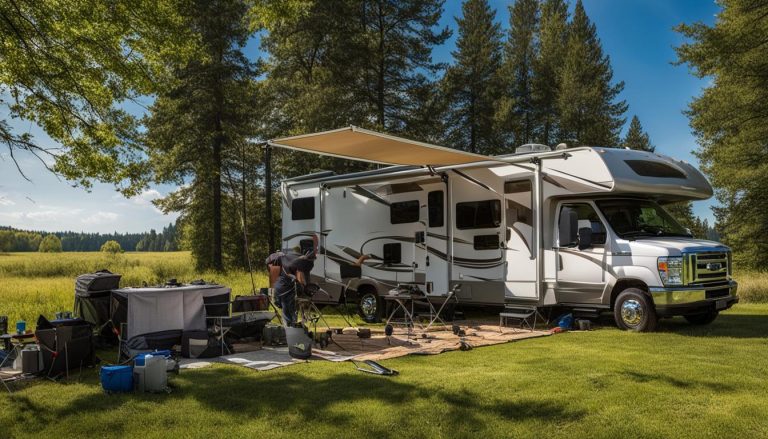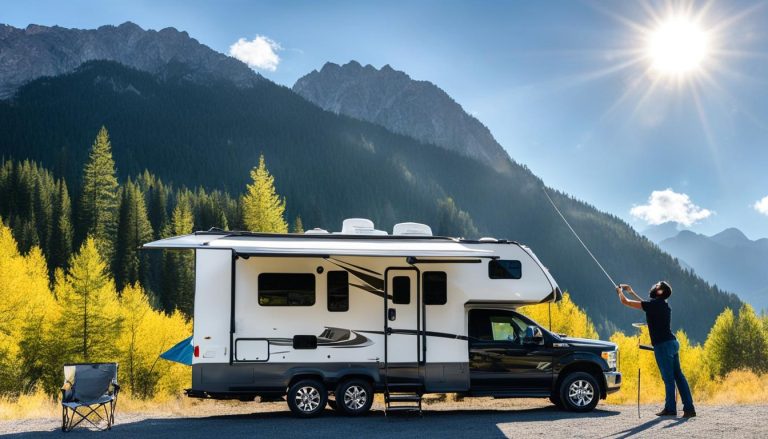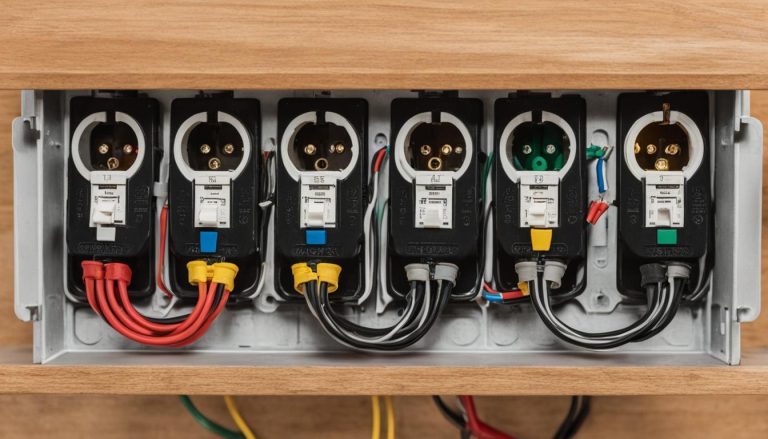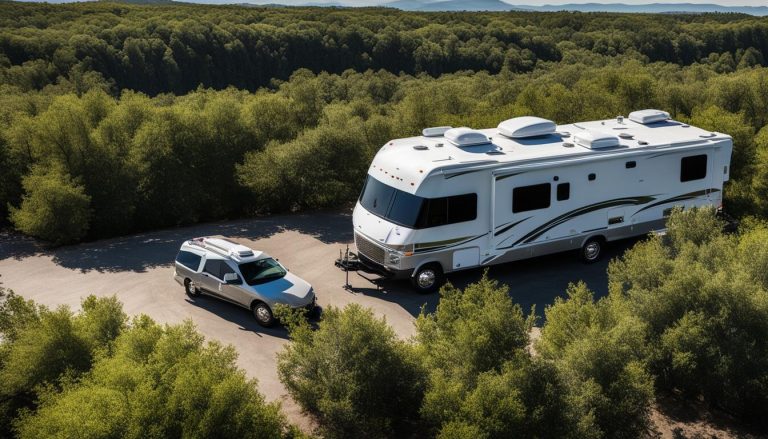Eliminate RV Sewer Odor: Quick & Effective Tips
gorvlifestyle.com and its partners may earn a commission if you purchase a product through one of our links
RV sewer odors can be unpleasant and persistent, but there are several effective tips to help eliminate them. By following these quick and easy methods, you can get rid of sewer smells in your RV and enjoy a fresh and odor-free environment. From refilling the water in your tank to preventing clogs and cleaning the toilet and holding tank, these tips will keep your RV smelling clean and fresh on the road.
Key Takeaways:
- Regularly refill the water in your black water tank to prevent it from drying out and causing odors.
- Add water with each flush of the toilet to keep the tank properly balanced and control odors.
- Use black water tank chemicals to neutralize odors and break down waste effectively.
- Prevent clogs by using RV-grade toilet paper and cleaning the tank regularly.
- Thoroughly clean the holding tank, toilet, and flapper to eliminate residual odors.
When it comes to eliminating sewer smells in your RV, proactive maintenance is key. By implementing these tips, you can enjoy a fresh and pleasant environment throughout your journey. Now that you know how to get rid of sewer smells in your RV, you can confidently hit the road without worrying about unpleasant odors or the infamous “camper smells like sewer” situation.
Refill the Water to Keep Things Flowing Smoothly
One of the main causes of sewer smell in RVs is a dry black water tank. To prevent this, it is important to refill the water in your tank regularly. Adding enough water to cover the bottom of the tank is crucial to keep waste from drying out and causing odors. Depending on the size of your tank, you may need to add several toilet bowls’ worth of water to ensure proper coverage.
If you’re wondering how much water to add to your RV black water tank, it’s recommended to fill it at least one-third to one-half full. This will provide enough water to prevent waste from drying out and keep your tank functioning properly.
It’s essential to note that adding water to your RV black water tank is not the same as filling it to capacity. Overfilling the tank can lead to unwanted spills or leaks, so be sure to add water in moderation and avoid overloading the system.
Regularly refilling the water in your RV tank is a simple yet effective way to maintain proper hygiene and prevent unpleasant odors. By keeping your black water tank adequately filled, you can ensure a smooth and odor-free RVing experience.
| RV Tank Size | Recommended Water Level |
|---|---|
| Small (20-30 gallons) | Fill at least one-third to one-half full |
| Medium (30-40 gallons) | Fill at least one-third to one-half full |
| Large (40+ gallons) | Fill at least one-third to one-half full |
Add Water With Each Flush and Use Black Water Tank Chemicals
Another effective way to prevent sewer smells in your RV and maintain a fresh environment is by adding water with each flush of the toilet. This simple step helps keep the tank properly balanced with liquid, which in turn helps control odors.
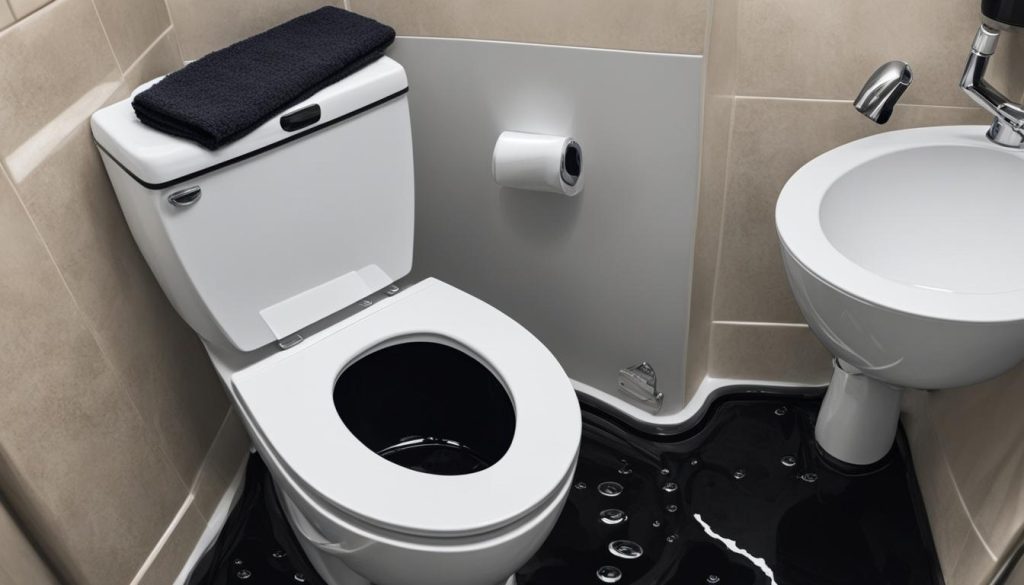
Remember to use black water tank chemicals to further assist in neutralizing odors and breaking down waste. These specialized chemicals are designed to be safe for RV systems and can be easily added to the toilet as instructed.
Benefits of Adding Water and Using Black Water Tank Chemicals
“Adding water to the RV toilet with each flush is essential for preventing drying out of waste in the holding tank, which causes unpleasant odors. Additionally, using black water tank chemicals ensures that the waste is properly treated and odors are minimized, providing a more enjoyable RV experience.”
A well-balanced black water tank with adequate water and the right chemicals enables efficient waste breakdown and control of odors, enhancing the overall comfort of your RV travels.
| Benefits of Adding Water & Using Black Water Tank Chemicals | Preventive Actions |
|---|---|
| Controls odors in the RV | Add water with each flush |
| Promotes proper waste breakdown | Use black water tank chemicals |
| Keeps the holding tank in good condition | Follow manufacturer instructions for chemical use |
By adding water with each flush and utilizing black water tank chemicals, you can effectively prevent RV toilet odors and maintain a fresh-smelling interior. These simple practices go a long way in ensuring a pleasant RV experience for you and your travel companions.
Preventing and Cleaning Clogs
Clogs in the black water tank can lead to unpleasant odors in your RV. To prevent clogs and keep your sewer system flowing smoothly, follow these simple tips:
1. Use RV-Grade Toilet Paper
Using RV-grade toilet paper that is biodegradable and designed to dissolve quickly can help prevent clogs in your black water tank. Avoid using regular household toilet paper, as it may not break down adequately and can cause blockages.
2. Empty and Rinse the Tank Regularly
Regularly emptying and rinsing your black water tank is crucial in preventing clogs and maintaining a clean system. Follow these steps:
- Find an appropriate RV dump station and open the tank valve to empty the contents.
- Rinse the tank thoroughly using a dedicated tank-rinsing wand or built-in flushing system. This helps remove any debris or buildup that could lead to clogs.
- Close the tank valve and ensure it is tightly sealed before proceeding.
3. Consider Using a Tank Additive
Adding a tank additive to your black water tank can help break down waste and prevent clogs. Look for RV-specific tank treatments that are designed to control odors and promote the breakdown of organic matter. Follow the instructions provided by the manufacturer to ensure proper usage.
4. Seek Professional Help if Needed
If a clog does occur despite preventative measures, it is best to seek professional assistance. RV service centers have the expertise and specialized tools to safely and effectively unclog a black water tank. Trying to unclog it yourself may cause further damage or odors.
Expert Tip
“Regular maintenance and preventive measures can go a long way in keeping your RV’s black water tank clog-free. By using the right toilet paper, emptying and rinsing the tank regularly, adding tank additives, and seeking professional help when needed, you can ensure a clean and odor-free sewer system.”
By following these preventive measures and keeping your black water tank clean, you can prevent clogs and avoid unpleasant odors in your RV. Remember to use RV-grade toilet paper, regularly empty and rinse the tank, consider using a tank additive, and seek professional help if needed. A well-maintained sewer system will contribute to a more enjoyable and odor-free RVing experience.
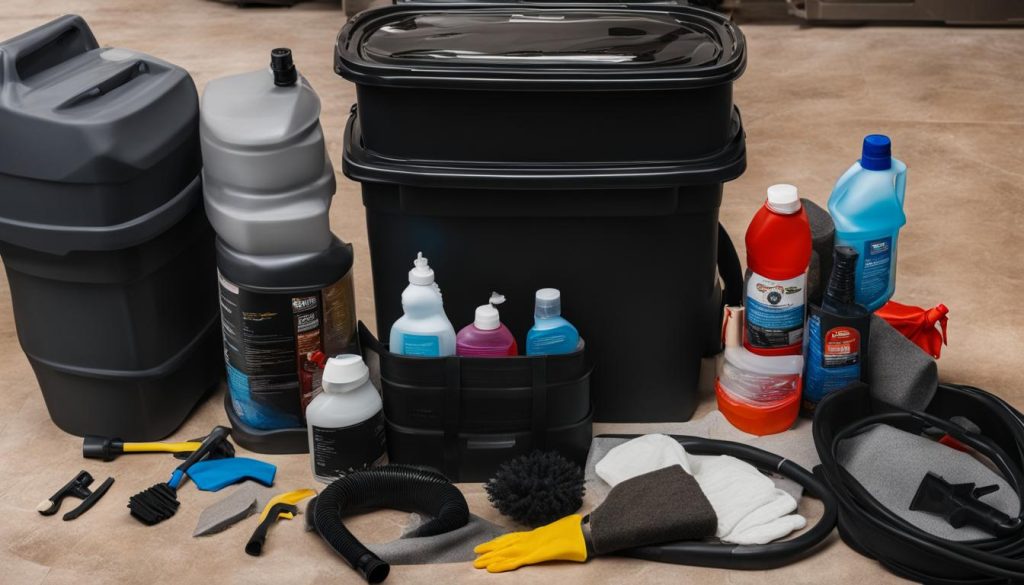
Scour and Clean Your Tank, Clean the Toilet and the Flapper, Repair Work Needed
Regularly cleaning your RV’s holding tank is essential in keeping sewer smells at bay. A thorough cleaning, including the sides of the tank where debris may accumulate, should be performed a few times a year. This ensures that any buildup or residue that can contribute to unpleasant odors is eliminated.
In addition to cleaning the holding tank, it is important to clean the toilet and the flapper. Over time, these components can also accumulate residue and develop odor-causing bacteria. By regularly cleaning and disinfecting them, you can effectively eliminate any residual odors and maintain a fresh-smelling RV toilet.
If despite your best efforts, sewer smells persist, it may be an indication of underlying issues with your RV’s black water tank or toilet system. In such cases, professional repair work may be needed to address leaks, damage, or malfunctioning components. Getting timely repairs can not only resolve the odors but also prevent further damage to your RV’s plumbing system.
FAQ
How often should I refill the water in my RV’s black water tank?
It is important to regularly refill the water in your RV’s black water tank to prevent sewer smells. Adding enough water to cover the bottom of the tank is crucial to keep waste from drying out and causing odors. Depending on the size of your tank, you may need to add several toilet bowls’ worth of water to ensure proper coverage.
How can water help prevent sewer smells in my RV?
Adding water with each flush of the toilet helps keep the black water tank properly balanced with liquid, which controls odors. It also prevents waste from drying out and causing unpleasant smells. By using enough water, you can maintain a fresh and odor-free environment in your RV.
Should I use black water tank chemicals in my RV to eliminate odors?
Yes, using black water tank chemicals can be beneficial in neutralizing odors and breaking down waste in your RV’s black water tank. These chemicals are specially formulated to be safe for RV systems and can be added to the toilet according to the instructions provided.
How can I prevent clogs in my RV’s black water tank?
To prevent clogs in your RV’s black water tank, it is important to use RV-grade toilet paper that is biodegradable and won’t cause blockages. Avoid using regular household toilet paper, as it can lead to clogs. Regularly cleaning the tank and seeking professional services if a clog does occur can also help eliminate odors and keep the system functioning properly.
How often should I clean my RV’s holding tank?
It is essential to regularly clean your RV’s holding tank to keep sewer smells at bay. A thorough cleaning, including the sides of the tank where debris may accumulate, should be performed a few times a year. Additionally, cleaning the toilet and flapper can help eliminate any residual odors caused by buildup.
What should I do if odors persist despite cleaning and preventive measures?
If odors persist in your RV despite your cleaning and preventive efforts, it may be necessary to seek professional repair work. There could be leaks or damage to the black water tank or toilet system that needs to be addressed by a professional.

